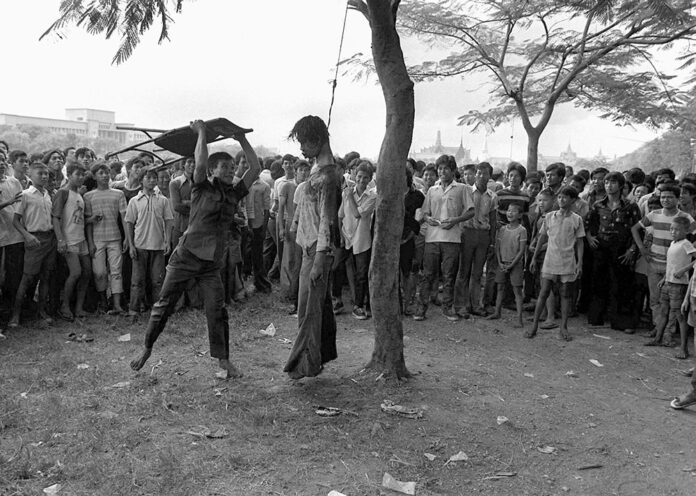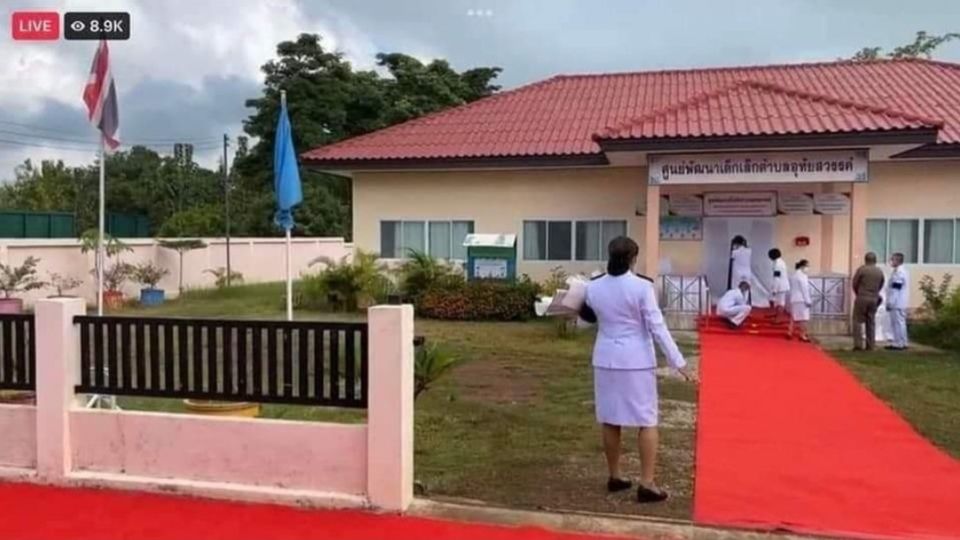One day after an ex-cop butchered toddlers by the dozens, calls are ringing from the fringes for reforms, gun controls and mental health care. But don’t expect soul-searching from those at the apex, whose grip on power is sustained by an impunity that relies on a prescription of historical blindness.
Not from those who, on the same day, literally walled off a blood-stained field to bar any attempt to memorialize the murder of dozens of youths 46 years earlier by furious nationalists and security forces fed a diet of Western Cold War hysteria and disinformation by the army itself. The spectacle of violence on that Oct. 6 – the slaughter, lynchings, and post-mortem mutilation of youths before leering crowds – was effectively memory-holed to avoid any reckoning.
Apart from those trying to preserve the memory of that trauma, few were likely even aware of yesterday’s anniversary of the Thammasat University massacre when former police Sgt. Panya Kamrab stormed into a day care center to slash and shoot sleeping children as young as 2 during nap time.
It’s hard to believe that the normalization of mass violence in the American-dominated global culture played no role in Panya’s now unknowable motivation. But today’s Thailand is fertile ground for the spectacle of violence that assigns the murder of children a higher score than the civilians gunned down by Sgt. Major 1st Class Jakrapanth Thomma two years ago in Korat.

Thailand is ill-equipped to respond, in part because there is unlikely to be a national reckoning. No conversation about the consequences of leaning corrosively into authoritarianism and patriarchy. About the absolute impunity enjoyed by those atop the sacred hierarchy, and widely held notions that those at the bottom – especially children – deserve torment. Torment owed by fate, karma, hand-me-down trauma, the pecking order, or other societal shrugs.
I cannot feel any optimism for a response beyond rehearsed, empty gestures presaging a compulsion to look the other way. Some symbolic spiritual atonement, perhaps fish freed into a stream, and some thousands of baht assigned as compensation for incalculable pain, while a storm of celebrities and those in the highest reaches of power jockey for visibility.
History doesn’t repeat outright, but it does rhyme. The impulse to collectively look the other way forms cataracts. Unaddressed and undiscussed horrors linger in peripheral vision, collagen floaters that dance away from occasional, furtive glances.
Thailand, as anywhere, has stories it prefers to tell about itself. But the story told by the people who hold the guns and power – that they are the protectors – isn’t holding any longer. Not when the recent boom in mass murder culture has been perpetuated by men in uniforms, former or otherwise.
There’s another story told of Thailand that is based on its generous, compassionate, and giant-hearted masses. Will they sustain conversations about the perils of military hegemony? The free flow of guns and appetite to ape the power of those in charge? The lack and outright stigmatization of mental health care?
We will know the answer next Oct. 6.
Related
Thais demand change after disgraced cop kills 36
Ex-cop who murdered dozens at child center in Thai northeast kills self




